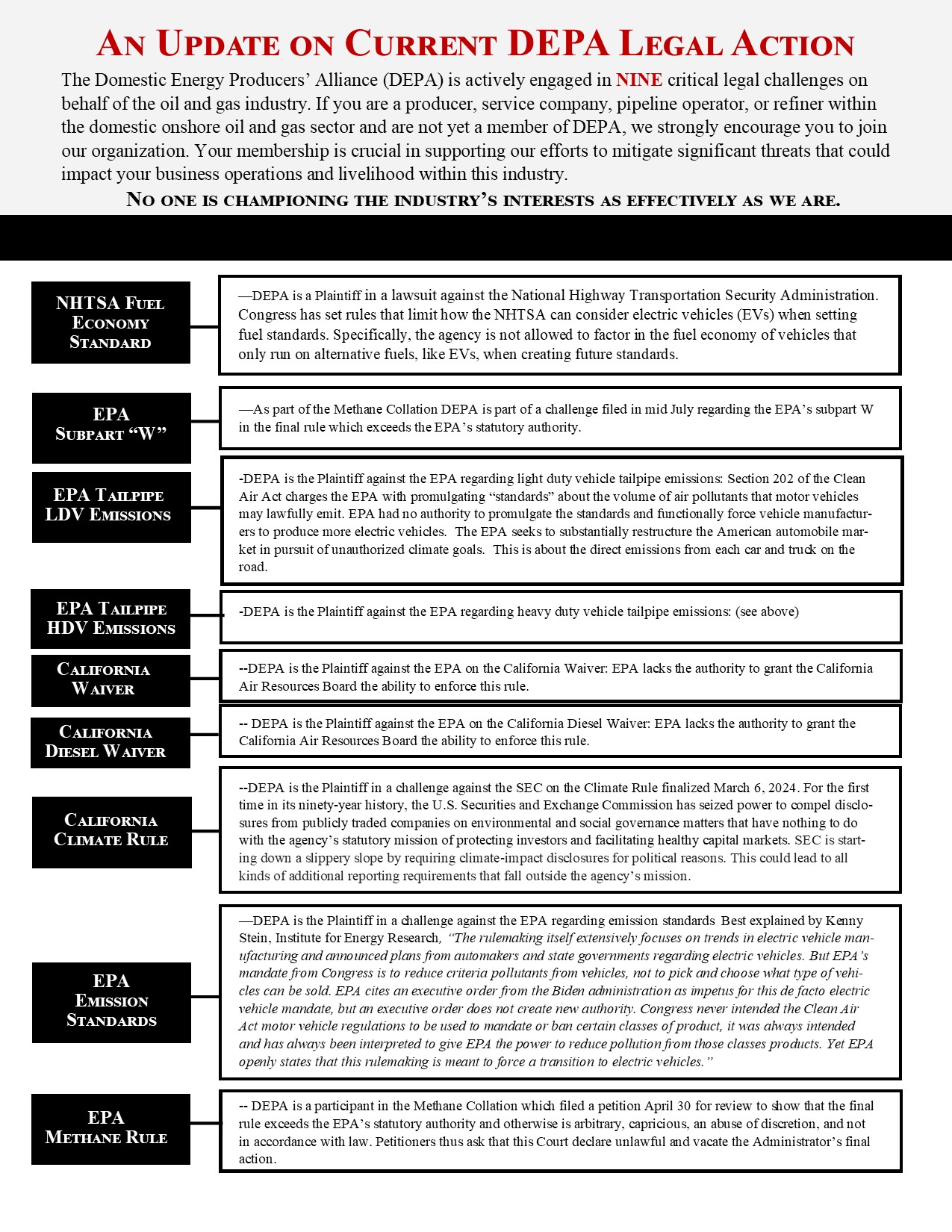Information updated August 2024

Hover Over the Graphic for Additional Info
EPA Subpart W Lawsuit Filed June 2024
Subpart W covers ten segments of the petroleum and natural gas industry:
- onshore petroleum and natural gas production,
- offshore petroleum and natural gas production,
- onshore natural gas processing,
- natural gas transmission compression,
- underground natural gas storage,
- liquefied natural gas (LNG) storage,
- LNG import and export equipment,
- natural gas distribution,
- onshore petroleum and natural gas gathering
and boosting, - and onshore natural gas transmission pipeline
With this action, the U.S. Environmental Protection Agency (EPA) is
finalizing amendments to the Petroleum and Natural Gas Systems source
category (subpart W) of the Greenhouse Gas Reporting Program (GHGRP).
Full article is in the July 2024 DRILLER
NHTSA Fuel Standards Lawsuit Filed August 2024
DEPA is a Plaintiff in a lawsuit against the National Highway Transportation Security Administration (NHTSA). Congress has set rules that limit how the NHTSA can consider electric vehicles (EVs) when setting fuel standards. Specifically, the agency is not allowed to factor in the fuel economy of vehicles that only run on alternative fuels, like EVs, when creating future standards.
The NHTSA issued new vehicle fuel economy standards June 7, 2024,
touting the estimation that will new standard will save Americans more than $23 billion in fuel costs while reducing pollution. This rule is in accordance with continuous energy security efforts that date back to the 1970s, when the
average vehicle got about 13 miles to the gallon.
In this final rule, fuel economy will increase 2% per year for model years 2027-2031 for passenger cars, while light trucks will increase 2% per year
for model years 2029-2031. These increases will bring the average light-duty vehicle fuel economy up to approximately 50.4 miles per gallon by model year 2031.
Full article is in the August 2024 DRILLER
EPA LDV Emissions Lawsuit Filed June 2024
In a powerful coalition, more than a dozen prominent organizations, including DEPA, have joined forces to file a legal challenge to the U.S. Environmental Protection Agency’s (EPA) regulation finalized in March set to drastically reshape the automotive landscape by effectively banning most new gas cars and trucks within the next eight years.
This petition is one of three filed on June 13, 2024 challenging the EPA’s light and medium duty vehicle emission standards for model years 2027-2032. The other two petitions were filed by the American Petroleum Institute and a coalition of U.S. biofuel producers. In total, 36 petitioners are represented among the three filings.
“EPA’s Light Duty Vehicle rule is unlawful and harmful to consumers, our economy and our national security. We are confident the Court will agree that Congress has not authorized EPA to effectively ban the sale of new gas and diesel cars and overhaul the U.S. economy in such a major way,” said Chet Thompson, President and CEO, American Fuel & Petrochemical Manufacturers (AFPM)
Full article is in the June 2024 DRILLER
EPA HDV Emissions Lawsuit Filed June 2024
DEPA joined a dozen US energy producers, marketers, retails, machinists and consumer groups for an additional lawsuit against EPA’s electric mandate for heavy trucks filed June 18, 2024.
Lawsuit number six is basically the same fight as number seven. The difference is light duty vs heavy trucks.
“The EPA does not have authority under the Clean Air Act to restrict Americans’ access to or use of internal combustion engine technology. The Heavy Duty Vehicle (HDV) regulation finalized this spring aims to phase out trucks that run on American-made, American-grown diesel, biodiesel, renewable diesel and renewable natural gas. Americans will pay dearly because of it.
“This policy will increase costs for consumers, dramatically strain the U.S. electric grid, contribute to more traffic and congestion on roads, undermine our energy independence, and impact every sector of the U.S. economy. EPA, quite simply, cannot do something so sweeping on its own without express legislative direction from Congress.” – Rich Moskowitz, AFPM General Counsel
Full article is in the June2024 DRILLER
California Waiver Lawsuit
DEPA is the Plaintiff against the EPA on the California Waiver: EPA lacks the authority to grant the California Air Resources Board the ability to enforce this rule.
When EPA proposed new emissions standards seeking a substantial restructuring of the American automobile market in pursuit of unauthorized climate goals, someone had to step in. Someone had to say EPA has no authority to promulgate the Standards and functionally force vehicle manufacturers to produce more electric vehicles. DEPA became the Plaintiff in the Competitive Enterprise Institute (CEI) V EPA Brief filed in November 2022.
The EPA and the National Highway Traffic Safety Administration (NHTSA), in close coordination with the State of California, have embarked on a concerted effort to force electrification of the Nation’s vehicle fleet with the California Waiver.
DEPA stepped up as a Plaintiff under the American Fuel and Petrochemical Manufactures (AFPM) suit in the DC Circuit. DEPA member California Independent Petroleum Association (CIPA) is our Declarant in the case. Oral Arguments were held in September 2023 and the case moves forward.
California Diesel Waiver
DEPA is the Plaintiff against the EPA on the California Diesel Waiver: EPA lacks the authority to grant the California Air Resources Board the ability to enforce this rule.
This lawsuit is very similar to the California Waiver, it is simply specific to diesel fuel.
California Climate Rule
March 11, 2024, DEPA and Texas Alliance of Energy Producers filed suit to block the Securities and Exchange Commission’s new rule requiring publicly traded companies to make onerous disclosures about greenhouse gas emissions and other climate-related issues.
The Climate Rule was adopted by the SEC on March 6, 2024. Companies and organizations on both sides fired at the SEC. Some complaints came from organizations like the Sierra Club and Earthjustice stating the rules don’t do enough with Scope 3 emissions disclosures removed from the rule. However, many academics and experts have agreed the Sierra Club’s argument is difficult to make.
“The SEC’s mandate is to ensure that companies disclose important information so that investors can evaluate the health of companies. That’s not a license to publicly shame companies for business practices they don’t like,” said Luke Wake, an attorney at Pacific Legal Foundation. “Congress did not authorize the SEC to demand that companies report environmental or any other controversial issues completely unrelated to finance.”
Jerry Simmons President/CEO of DEPA said “We are thrilled to have the Pacific Legal Foundation representing us in this fight to push back at these government agencies and the dramatic regulatory overreach from their Congressionally mandated purpose. Congress authorized the SEC to protect investors from fraud, facilitate capital formation, and require only material disclosures related to investing. Simmons said “The new rule (almost 900 pages long) does nothing to help investors get a greater return or make any difference in the climate. This is simply to force a political and ideological position onto US companies.”
EPA Methane Rule
In November 2021, EPA proposed a rule to reduce methane emissions from oil and gas sources through the imposition of standards and requirements on new, modified and reconstructed sources. November 2022, EPA proposed a supplemental rule to reduce methane emissions, which addressed public comments to the 2021 Proposed Rule and made adjustments due to new legislation.
On December 2, 2023, the Biden Administration announced its final rule under the Clean Air Act.
DEPA joined the Producers Associations’. A group which met regularly in an effort to prepare comments for submission to the EPA. EPA said it considered nearly one million comments on two proposals (subpart OOOOb and OOOOc) as it developed the final rule.
House Energy and Commerce Committee Chair Cathy McMorris Rodgers (R-WA) delivered said the following during the February Environment, Manufacturing, and Critical Materials Subcommittee hearing on the EPA’s burdensome new regulations. “The EPA’s latest proposal, if implemented, would impose additional burdensome regulations for methane, which would further stifle innovation, increase operational costs for producers, and increase the price of energy. These burdens will fall directly on American families and businesses.”
DEPA Executive Board Member Patrick Montalban testified during the hearing.
EPA Emissions Standards
In April 2023, the EPA proposed new standards to reduce air pollutant emissions from light- and medium-duty vehicles starting with model year 2027. These standards aim to significantly reshape the U.S. auto market to meet climate goals not authorized by the Clean Air Act. The Act, under Section 202, only allows the EPA to set standards for the volume of pollutants vehicles may emit, not to push a shift toward electric vehicles. The proposed standards could strain the electric grid, threatening its reliability—a domain where the EPA cannot act without clear congressional authorization. Additionally, they pose a national security risk by increasing dependence on materials largely sourced from China and other hostile nations.
The standards are also considered arbitrary and capricious due to their reliance on flawed “social cost” estimates of greenhouse gases, which account for global rather than U.S.-specific impacts. The EPA lacked authority to set standards based on these extra-territorial concerns and failed to justify its new “social cost” analysis, which skews the cost-benefit comparisons by inconsistently applying certain assumptions.











